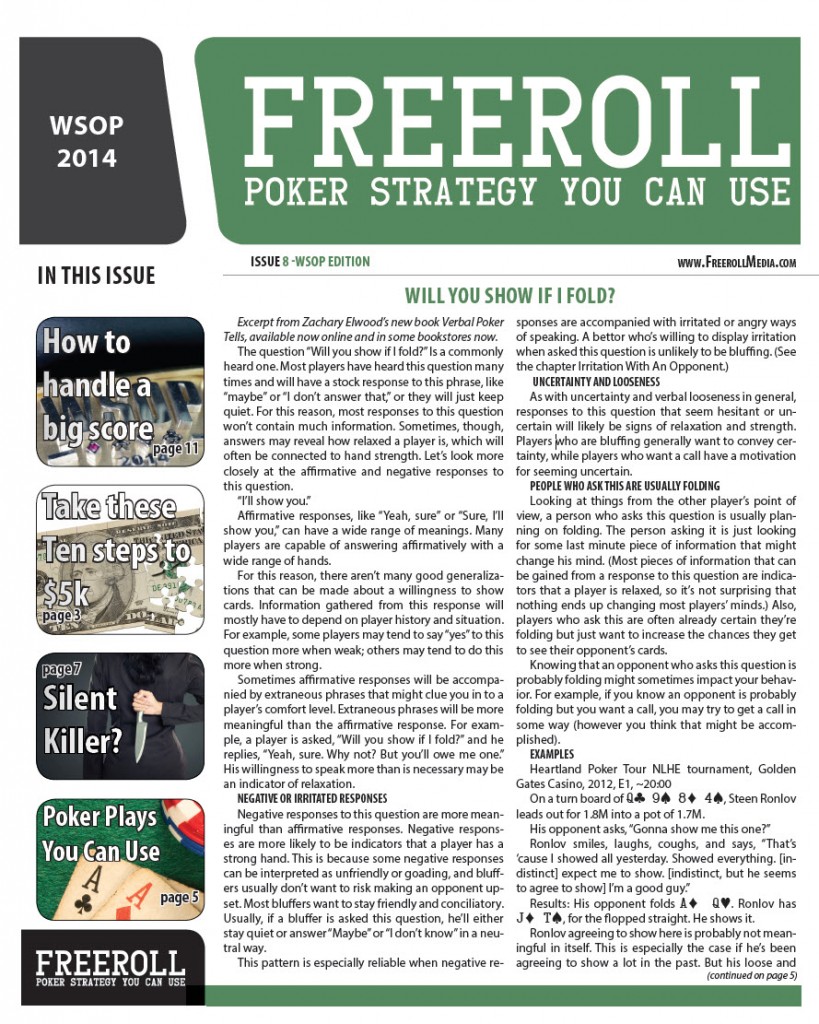Mucking philosophy
- By Andrew Seidman
- February 20, 2014
- Comments Off on Mucking philosophy
 If you’ve ever played Heads-up, think about how tilting it is when your opponent is running hot. You raise, he three-bets, you four-bet bluff, he shoves.
If you’ve ever played Heads-up, think about how tilting it is when your opponent is running hot. You raise, he three-bets, you four-bet bluff, he shoves.
You fold.
You bet the flop, two-barrel the turn, and then he bets the river. You fold. You thinly value bet the turn and he raises. You fold. Let’s be honest here, you’re still playing great. But you’re kinda pissed off. More so than if he had checked that river and won, more so than if he had just called that turn instead of raised. In short, not seeing your opponents cards does two things: it keeps us from knowing how they play (this is common knowledge), but it also keeps us from satisfying one of our most instinctual, natural psychological necessities –- knowing the intangible answer or conclusion to the hand. Let me put it this way: every good joke has a punchline. If we hear a joke and then not the punchline, it frustrates us. Every good story has an ending. If you get left on a cliffhanger without a resolution, you get frustrated (and thusly tricked into watching LOST again the next week, but that show is so good that its okay).
The same thing happens over the course of a poker hand.
The simple idea is this– not allowing your opponent to see your cards does more than simply deprive them of valuable information they could use against you. It is tilting. There is a psychological edge in making your opponent muck that will manifest itself later in the match.
This means that when you have close choices (Do I bet for thin-value or check? Do I make this bold, thin-bluff raise or not? 4-bet bluff or flat call?) you should be inclined to take the more aggressive option. Even if its slightly wrong, it won’t be too wrong, and it does wonders for game flow.
Now I’ll try to think of a few examples that might elucidate:
In a Heads-up match, you raise Q8 OTB and get a call from the blinds. The flop is Q43 with a flush draw. He checks, you bet, and he check raises. You don’t really think he’s good enough to check raise a top pair hand here (maybe AQ, but he’d probably 3-bet). So his range is either monster stuff (sets or slowplayed big stuff), or, more likely, draws or air. You call. The turn is a 9, and he fires again. Let’s say that you know he probably only fires the turn with some kind of equity, and you think he probably check folds the river some percentage of the time when he misses. It’s a close call– raise or fold? This is a spot where I would raise. Call it capitalization of dead money, value, both, or whatever. Either way, if he had the nut flush draw, or 56 for a straight draw, it is tilting to muck there. That’s the basic idea.


